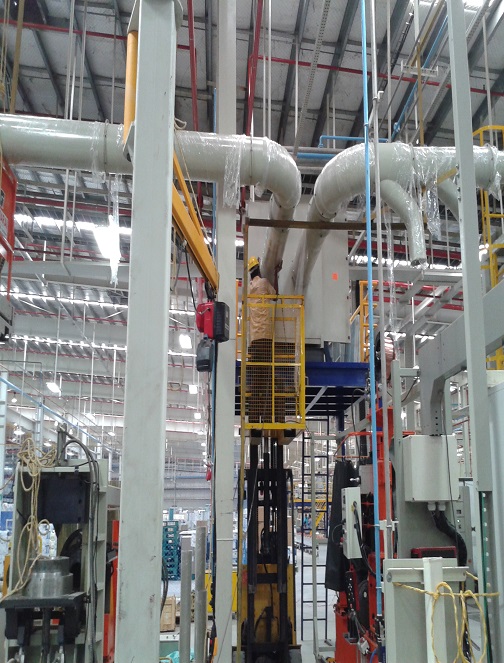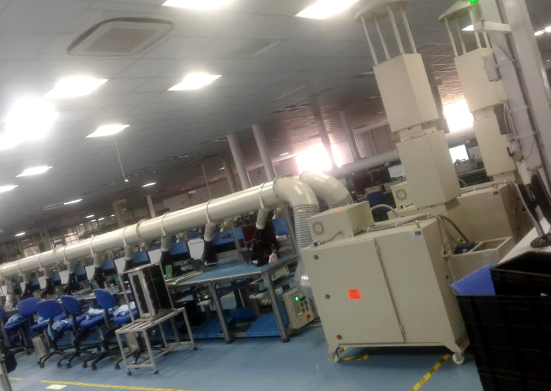Choosing the right air pollution control equipment for your business is a critical decision that can significantly impact operational efficiency, regulatory compliance, and workplace safety. The right equipment not only ensures that your facility meets stringent environmental standards but also enhances the health and well-being of your employees. With various types of air pollution control systems available, it is essential to understand the specific needs of your business and select the most suitable solutions. Here, we outline key considerations and steps to help you make an informed decision.
Firstly, it is crucial to identify the types of pollutants generated by your industrial processes. Air pollution control equipment is designed to target specific contaminants, such as dust, fumes, smoke, and mist. For instance, if your operations involve welding or soldering you will need equipment capable of capturing and neutralizing fine particulate matter and harmful gases like a welding fume extractor or soldering fume extractor. On the other hand, processes like grinding and buffing may produce larger dust particles that require different filtration technologies like dust collectors or if the dust is fine or is generated in large volume, a self-cleaning dust collector which would be capable of handling the pollutants. Conducting a thorough assessment of the pollutants in your facility will guide you in selecting the appropriate equipment.
Understanding the volume and concentration of pollutants is also essential. High-volume operations that produce significant amounts of contaminants will need robust and high-capacity air pollution control systems. Conversely, smaller operations may be adequately served by more compact and lower-capacity units. Accurate measurements of pollutant levels can be obtained through air quality testing and monitoring, which provide valuable data for determining the necessary specifications of the equipment.
The layout and size of your facility play a significant role in the selection process. The physical space available for installing air pollution control equipment must be considered to ensure that the chosen systems can be integrated without disrupting existing workflows. In some cases, custom-built solutions may be required to fit the unique spatial constraints of your facility.
Energy efficiency is another crucial factor to consider. Air pollution control equipment can consume substantial amounts of energy, contributing to operational costs. Selecting energy-efficient systems not only reduces your environmental footprint but also lowers energy expenses. Look for equipment with advanced technologies that minimize energy consumption while maintaining high filtration efficiency.
Maintenance requirements and ease of operation should also influence your decision. Regular maintenance is essential for the continuous effectiveness of air pollution control equipment. Systems that are easy to maintain and operate can save time and reduce downtime, ensuring uninterrupted productivity. Choose equipment with accessible components and user-friendly interfaces to simplify maintenance tasks and allow your staff to manage the systems efficiently. Additionally, consider the availability of technical support and after-sales service from the equipment provider to address any issues promptly.
Compliance with environmental regulations is a fundamental consideration. Different industries are subject to various regulatory standards regarding emissions and air quality. Ensuring that your chosen air pollution control equipment meets these regulations is critical to avoid fines and legal complications. Reputable providers like Powertech Pollution Controls design their systems to comply with the latest environmental standards, giving you confidence that your operations remain within legal limits.
Cost is inevitably a key factor in the decision-making process. While it may be tempting to choose the least expensive option, it is important to consider the long-term value and return on investment. High-quality air pollution control equipment that is reliable, efficient, and durable can provide significant cost savings over time by reducing maintenance expenses, energy consumption, and downtime. Evaluate the total cost of ownership, including installation, operation, and maintenance costs, to make a well-rounded decision.
Customization options can greatly enhance the suitability of air pollution control equipment for your specific needs. Off-the-shelf solutions may not always address the unique challenges of your industrial processes. Custom-designed systems that are tailored to your requirements can offer superior performance and efficiency. Powertech Pollution Controls specializes in providing custom air pollution control solutions that are designed to meet the exact needs of each client, ensuring maximum effectiveness and compliance.
Consider the reputation and experience of the equipment provider. Established providers with a proven track record in the industry are more likely to offer high-quality products and reliable service. Research the provider’s history, read customer reviews, and ask for references to gauge their expertise and customer satisfaction levels. A reputable provider like Powertech Pollution Controls can offer valuable insights and recommendations based on their extensive experience in the field.
In conclusion, selecting the right air pollution control equipment for your business involves careful consideration of various factors, including the types and volume of pollutants, facility layout, energy efficiency, maintenance requirements, regulatory compliance, cost, customization options, and the reputation of the provider. By thoroughly assessing these aspects and involving key stakeholders, you can make an informed decision that enhances air quality, ensures compliance, and promotes a safe and productive work environment. Powertech Pollution Controls is committed to helping businesses find the most effective air pollution control solutions, offering expert guidance and customized systems tailored to your specific needs. For more information, please visit our product page or contact us here.





